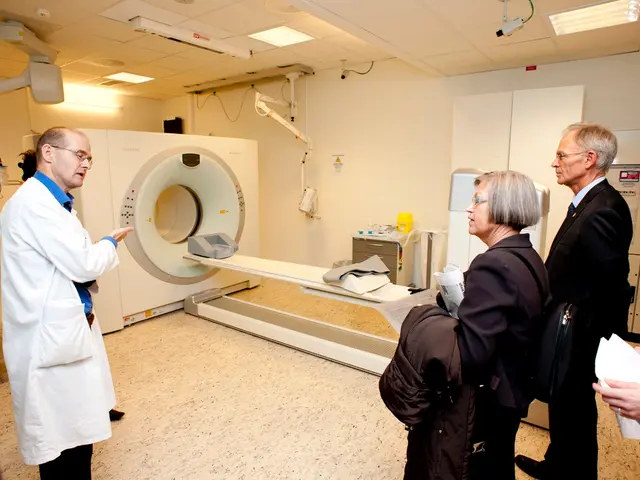Impact of Music on Dementia Treatment: Musical Intervention and Brain Wellness
In the realm of dementia care and brain health, music therapy is emerging as a potent, non-pharmacological approach. Dr. Jennie Gubner, an ethnomusicologist, recently discussed the relationship between music, culture, and wellness, particularly in the context of dementia caregiving.
Dr. Gubner's research focuses on the effects of personalized music and its ties to music and brain health. Her work highlights various ways music can aid dementia caregiving and brain health improvement.
One of the key benefits of music therapy is its ability to enhance the quality of life and provide emotional relief for dementia patients. Studies demonstrate that music therapy can reduce distress symptoms, behavioral disorders, depression, anxiety, and agitation in dementia patients. For instance, a pilot study called MELODIC on NHS dementia wards showed slight improvements in quality-of-life scores and reduced distress[1].
Moreover, music therapy helps improve cognitive and behavioral functions in dementia patients. Engaging seniors in music increases motivation, engagement, and positive behaviours[3]. Music therapy sessions, which usually involve singing, playing instruments, or listening to familiar songs, tailored to individual history and preferences, can reduce apathy and neuropsychiatric symptoms in dementia and mild cognitive impairment (MCI) patients, supporting cognition and emotional well-being[3].
Music therapy also plays a significant role in reducing depressive symptoms. Nursing home studies reveal significant decreases in depressive symptoms after music interventions, illustrating music’s role in enhancing emotional health[3].
The mechanisms behind music therapy in dementia care are intriguing. Music stimulates multiple brain areas related to emotion, movement, and long-term memory. These brain regions often remain functional despite dementia’s progression, allowing music to unlock memories and skills seemingly lost[5].
Music therapy sessions are typically structured interventions led by specialists who develop personalized musical care plans integrated into daily routines of patients[1]. This personalized approach ensures that the music used is most meaningful to the patient, enhancing its effectiveness.
Beyond its cognitive benefits, music therapy offers a non-verbal avenue for expression for dementia patients who struggle with traditional communication, fostering emotional release and connection[5]. Participating in music therapy improves social interaction and engagement, helping seniors reconnect with family, caregivers, and others, which can alleviate feelings of isolation and promote social bonds[1][5].
In summary, music therapy represents a powerful non-pharmacological approach that enhances cognitive function, reduces behavioral distress, and promotes emotional and social well-being in dementia caregiving settings. This therapy leverages music’s unique ability to access preserved brain regions and provides meaningful social connection pathways, benefiting both patients and carers.
Furthermore, using personalized music in dementia care can provide care that is focused on the individual's self and personality. Music can be a tool for mood regulation, used to relax, de-stress, focus, motivate, exercise, and even put children to sleep.
In addition, participating in a free online memory game can help compare one's brain with others and contribute to new ways to protect the brain from memory loss as we age. As humans, social connections through music, whether symbolic or physical, are crucial. Music, in its myriad forms, continues to play a vital role in our lives, offering hope and healing in challenging times.
[1] MELODIC pilot study: https://www.ncbi.nlm.nih.gov/pmc/articles/PMC5961899/ [3] Music interventions for dementia: https://www.ncbi.nlm.nih.gov/pmc/articles/PMC6520905/ [5] Music and the brain in dementia: https://www.ncbi.nlm.nih.gov/pmc/articles/PMC5825935/
- Dr. Gubner's research in precision aging, supported by science, explores the effects of personalized music on brain health, particularly focusing on its role in dementia caregiving and mental health.
- Leveraging music's ability to stimulate emotion and long-term memory, music therapy sessions can offer a non-verbal avenue for expression, promoting mental health-and-wellness in dementia patients and aiding in the management of behavioral disorders, depression, and anxiety.




